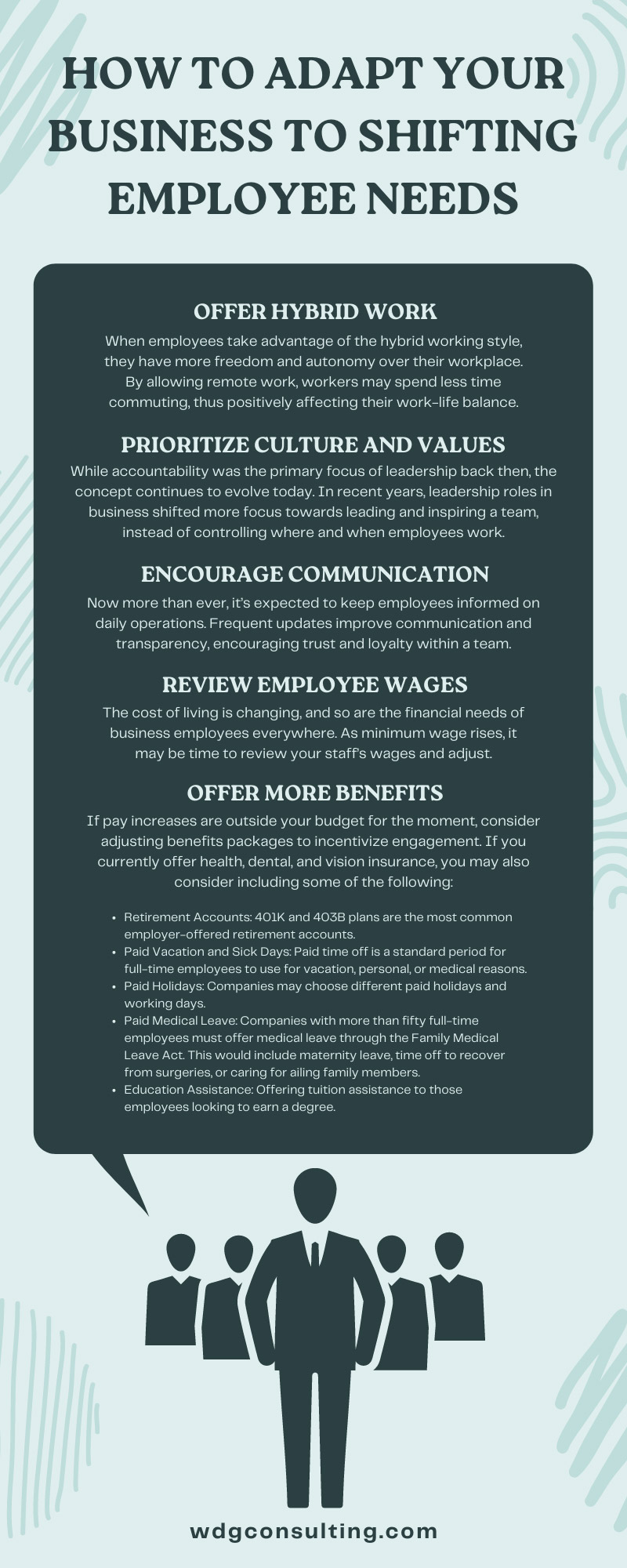How To Adapt Your Business To Shifting Employee Needs

To have a successful business is to expand, evolve, and adjust goals to promote progress further. Your company’s growth may rely on a detailed business plan and implementing growth strategies; however, your staff has a significant role to play as well.
As the core and glue to a company, employees carry out daily responsibilities to ensure a business’s smooth operation. As times change, your employees may require different accommodations and benefits to incentivize productivity and continued business development. To learn more about adapting your business to shifting employee needs, continue reading below.
Offer Hybrid Work
When coordinated strategically, the hybrid work model has the potential to improve your business and employee well-being.
Benefits to Employees
Improved Well-Being
When employees take advantage of the hybrid working style, they have more freedom and autonomy over their workplace. By allowing remote work, workers may spend less time commuting, thus positively affecting their work-life balance.
Increased Income
Interchangeable remote workdays may encourage employees to minimize commute costs and allocate funds towards disposable income.
Increased Flexibility and Mobility
Commute times were once a decisive element that determined an individual’s willingness and ability to work. However, hybrid working styles allow employees to work for businesses from various locations and have the option to work from the office at their discretion.
This increased flexibility and mobility make it much easier for individuals to find work without being forced to relocate.
Benefits to Company
Improved Employee Productivity
By incorporating the hybrid working style, companies can expect an improved employee mental well-being where they are happier and well-balanced. Improved moods promote increased productivity, thus making the business more competitive.
Improved Employee Retention
Despite contrary beliefs, hybrid work positively affects employee retention. Given its heightened appeal, workers opt to work for flexible companies catering to their shifting needs by offering remote work.
Expanded Hiring Pool
Businesses with hybrid working styles have the opportunity to cast their hiring nets further when looking for talent. An expanded hiring pool will significantly increase the number of candidates to select from.
Prioritize Culture and Values
While accountability was the primary focus of leadership back then, the concept continues to evolve today. In recent years, leadership roles in business shifted more focus towards leading and inspiring a team, instead of controlling where and when employees work.
Many individuals in leadership roles notice that productivity increases with a hybrid work model, and workers completed projects ahead of time when given autonomy in favor of micromanagement.
Leaders who view their team as equals rather than subordinates may also notice a greater loyalty to the business. Listening to employee needs and treating them with empathy and respect may also help leaders hire and retain talent.
Encourage Communication
Now more than ever, it’s expected to keep employees informed on daily operations. Frequent updates improve communication and transparency, encouraging trust and loyalty within a team.
Establishing various communication channels will incentivize employees to keep in touch and engage with one another.
Schedule Regular One-on-Ones With Employees
The “open-door” policy works because it encourages employees to communicate complaints, questions, concerns, and suggestions to those in leadership roles. One-on-ones offer dedicated time for workers to share goals, priorities, and additional information with their manager.
Prioritize Weekly Team Meetings
While one-on-ones are essential to understand an individual’s concerns, weekly team meetings aim to align all employees on the same plan. Team meetings may highlight weekly expectations and discuss key points that promote progress and encourage collaboration.
Establish a Safe Space for Open Workplace Communication
Employees deserve psychological safety within a workplace, promoting the ability to express one’s self without fear of negative career consequences.
To elaborate, it’s best to establish a healthy work environment where everyone is comfortable expressing ideas, criticism, and asking questions without feeling unvalued or inferior.
Leading by example may help create psychological safety. Clarify when information is unclear and remain honest when you don’t have sufficient information on a topic.
Encourage Feedback
Whether it be a one-on-one meeting or email report, providing and encouraging feedback is a challenge when communicated poorly. When met with inappropriate tone and delivery, many workers perceive criticism as a personal attack.
However, constructive criticism helps employees understand if they’re meeting goals and expectations, and can provide steps to ensure improvement. It’s best to provide specific examples during your communication and allow team members time to respond to critiques.
Review Employee Wages
The cost of living is changing, and so are the financial needs of business employees everywhere. As minimum wage rises, it may be time to review your staff’s wages and adjust.
By increasing employee wages, your team will understand that you value their contributions to the company and recognize the degree of work accomplished.
Offer More Benefits
If pay increases are outside your budget for the moment, consider adjusting benefits packages to incentivize engagement. If you currently offer health, dental, and vision insurance, you may also consider including some of the following:
- Retirement Accounts: 401K and 403B plans are the most common employer-offered retirement accounts.
- Paid Vacation and Sick Days: Paid time off is a standard period for full-time employees to use for vacation, personal, or medical reasons.
- Paid Holidays: Companies may choose different paid holidays and working days.
- Paid Medical Leave: Companies with more than fifty full-time employees must offer medical leave through the Family Medical Leave Act. This would include maternity leave, time off to recover from surgeries, or caring for ailing family members.
- Education Assistance: Offering tuition assistance to those employees looking to earn a degree.
It would help to ask employees what benefits they expect to see in future offers. Doing so will encourage team members to express their needs directly.
Progressing times and evolving circumstances may affect your business’s daily operations. Knowing how to adapt your business to employee needs can provide more support to ensure your team can perform duties with all necessary resources.
WDG Consulting has been the leading corporate site selection company since 1975. Our well-qualified site selection consultants provide recommendations based on your area of business and can assist you throughout the entire site selection process.

